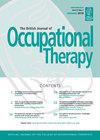The use of a walking aid before surgery is not related to worse short-term outcomes after simultaneous bilateral total knee arthroplasty
IF 1.3
4区 医学
Q3 REHABILITATION
引用次数: 0
Abstract
No study has been performed to compare patients’ pre- and post-operative knee disability, functional status, and length of hospital stay after surgery between patients with and without using a walking aid. One-hundred forty-five patients were enrolled and divided into four groups based on whether they used any walking aids before surgery: no walking aid, one cane, one elbow crutch, and two elbow crutches. The groups were compared for knee disability (Hospital for Special Surgery (HSS) knee score), functional status (Iowa Level of Assistance Scale (ILAS)), and length of hospital stay. For the pre-operative HSS knee scores, no statistically significant differences were found between the groups ( p > 0.05). For the pre-operative ILAS scores, the patients without using walking aids had better functional status than those using any walking aids ( p < 0.05). For the post-operative outcomes, no statistically significant differences were found between the groups in the HSS knee and the ILAS scores and length of hospital stay after surgery. In this population, using any walking aids before surgery is related to worse pre-operative functional status but not to the pre-operative knee disability. Furthermore, it is not related to the short-term outcomes after surgery.手术前使用助行器与同时进行双侧全膝关节置换术后短期结果恶化无关
没有进行任何研究来比较使用和不使用助行器的患者术前和术后膝盖残疾、功能状态和术后住院时间。145名患者被纳入研究,并根据他们在手术前是否使用任何助行器分为四组:无助行器、一根拐杖、一根肘部拐杖和两根肘部拐杖。比较各组的膝盖残疾(特殊外科医院(HSS)膝盖评分)、功能状态(爱荷华州援助水平量表(ILAS))和住院时间。对于术前HSS膝关节评分,两组之间没有发现统计学上的显著差异(p > 在术前ILAS评分方面,未使用助行器的患者的功能状态优于使用任何助行器(p < 0.05)。对于术后结果,在HSS膝关节、ILAS评分和术后住院时间方面,两组之间没有发现统计学上的显著差异。在这一人群中,术前使用任何助行器都与术前功能状态恶化有关,但与术前膝关节残疾无关。此外,它与手术后的短期结果无关。
本文章由计算机程序翻译,如有差异,请以英文原文为准。
求助全文
约1分钟内获得全文
求助全文
来源期刊

British Journal of Occupational Therapy
REHABILITATION-
CiteScore
2.20
自引率
15.40%
发文量
81
审稿时长
6-12 weeks
期刊介绍:
British Journal of Occupational Therapy (BJOT) is the official journal of the Royal College of Occupational Therapists. Its purpose is to publish articles with international relevance that advance knowledge in research, practice, education, and management in occupational therapy. It is a monthly peer reviewed publication that disseminates evidence on the effectiveness, benefit, and value of occupational therapy so that occupational therapists, service users, and key stakeholders can make informed decisions. BJOT publishes research articles, reviews, practice analyses, opinion pieces, editorials, letters to the editor and book reviews. It also regularly publishes special issues on topics relevant to occupational therapy.
 求助内容:
求助内容: 应助结果提醒方式:
应助结果提醒方式:


